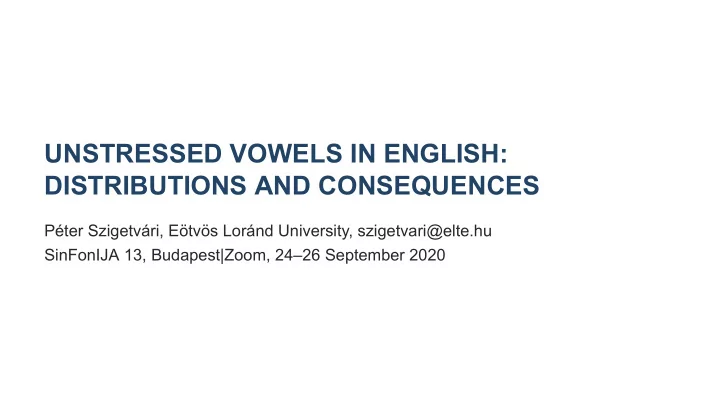

UNSTRESSED VOWELS IN ENGLISH: DISTRIBUTIONS AND CONSEQUENCES Péter Szigetvári, Eötvös Loránd University, szigetvari @elte.hu SinFonIJA 13, Budapest|Zoom, 24–26 September 2020
the vowel system of British English (BE) category _C _# _V checked i ə u e a o ✓ ✗ ✗ long i: ə: u: e: a: o: ✓ ✓ ✗ free/‘diphthongs’ aj aw ij əw uw ej oj ✓ ✓ ✓ STRUT is ə (Fabricius 2007, Szigetvári 2018) NEAR i: , CURE u: , SQUARE e: , and FORCE o: have monophthongized (Jones 1918, Upton 1995, Lindsey 2012, Cruttenden 2014) FLEECE ij and GOOSE uw are ‘diphthongs’ (Sweet 1900) 2
stress and syllable weight stressability scale (most to least, Hayes 1995) VV$ > VC$ > V$ ‘unstressability’ scale (most to least) V$ > VC$ > VV$ 3
the unstressed vowels of BE long vowels cannot be unstressed (cf the ‘unstressability’ scale) the three ‘nonlow’ checked vowels may be unstressed (cf Kenstowicz 1997) ( comic kómik , common kómən , commutate kómjutejt ) nonlow: i ə u unstressable nonhigh: e a o not unstressable three ‘diphthongs’ may also be unstressed ( volley vólij , veto víjtəw , value váljuw ) nonlow: ij əw uw unstressable nonhigh: ej aw aj oj not unstressable the three unstressable ‘diphthongs’ are not random, they contain i , ə , and u 4
the unstressed ‘diphthongs’ of BE HAPPY-tensing (Wells 1982): i → ij / _{#,V} * ij C; happy hápij , † hápi ; atrium éjtrijəm , ? éjtriəm omit əwmít ~ əmít ; veto víjtəw , * víjtə ; Genoa dʒénəwə , * dʒénəə (also fellow féləw ~‘colloquial’ félə ) volume vóljuwm ~ vóljum ; value váljuw , † válju ; usual júwʒuwəl , ? júwʒuəl _C _# _V ij ✗ ✓ ✓ ~ əw ✓ ✓ ~ uw ✓ ✓ 5
variability in unstressed position i → ə : devil dévil ~ dévəl , event ivént ~ əvént , octave óktiv ~ óktəv , menace ménis ~ ménəs , chicken tʃíkin ~ tʃíkən u → ə : accurate ákjurət ~ ákjərət , chasuble tʃázjubəl ~ tʃázjəbəl , amulet ámjulit ~ ámjələt 6
no variation cómic -ik , pólish -iʃ , óstrich -itʃ , víllage -idʒ , háppy -ij ie before a velar/palatal consonant (including j (!)) vólume -um , válue -uw ie before a labial consonant (including w (!)) 7
conclusion ij , əw , and uw must be VC, not VV (cf Trager & Bloch 1941), because we find i , ə , u and ij , əw , uw in unstressed position: the simplest generalization is that we have i , ə , u in both cases unstressed ij does not occur before C (unprecedented for a vowel): ij V and ij # are light syllables, ij C is heavy (=less unstressable) unstressed əw and uw simplify to ə and u before C (not elsewhere): for the same reason as * ij C unstressed i is stable before velar and palatal C, including j unstressed u is stable before labial C, including w 8
thanks to y’all to organizers to NKIFH #119863 to George Soros
references Cruttenden, Alan. 2014. Gimson’s Pronunciation of English (8th ed.). London & NY: Routledge ★ Fabricius, Anne. 2007. Variation and change in the TRAP and STRUT vowels of RP: A real time comparison of five acoustic data sets. Journal of the IPA 37: 293–320 ★ Hayes, Bruce. 1995. Metrical stress theory: principles and case studies. Chicago: University of Chicago Press ★ Jones, Daniel. 1918. An outline of English Phonetics. Leipzig: Teubner ★ Kenstowicz, Michael. 1997. Quality-sensitive stress. Rivista di Linguistica 9/1: 157–188 ★ Lindsey, Geoff, 2012. The British English vowel system. https://www.englishspeechservices.com/blog/british-vowels/ ★ Sweet, Henry. 1900. A new English grammar: Logical and historical. Oxford: Clarendon Press. ★ Szigetvári, Péter. 2018. Stressed schwa in English. The Even Yearbook 13: 81–95 ★ Trager, George L. and Bernard Bloch. 1941. The syllabic phonemes of English. Language 17: 223–246 ★ Upton, Clive (pronunciation editor). 1995. Concise Oxford English Dictionary (9th ed.). OUP ★ Wells, John C. 1982. Accents of English. CUP.
Recommend
More recommend